外研版(2019)高中英语选择性必修第二册 Unit1Growing upReview 精品课件(共22张PPT)
文档属性
| 名称 | 外研版(2019)高中英语选择性必修第二册 Unit1Growing upReview 精品课件(共22张PPT) |
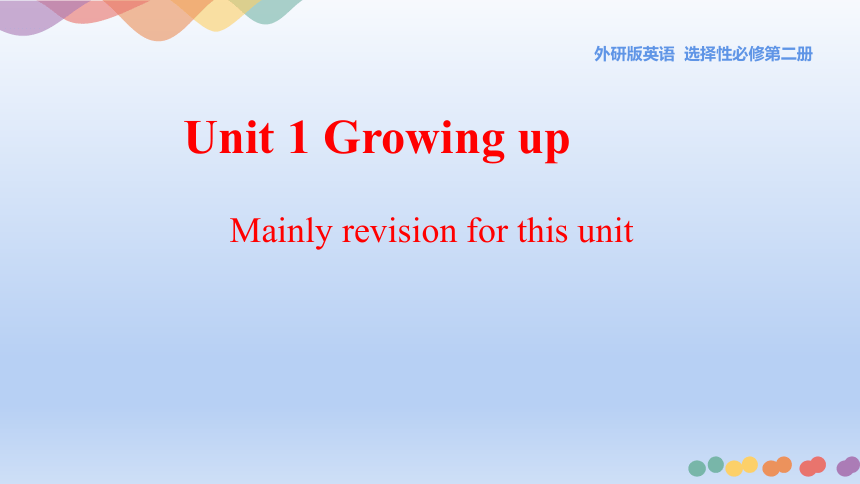
|
|
| 格式 | pptx | ||
| 文件大小 | 191.0KB | ||
| 资源类型 | 教案 | ||
| 版本资源 | 外研版(2019) | ||
| 科目 | 英语 | ||
| 更新时间 | 2023-03-03 18:41:45 | ||
图片预览

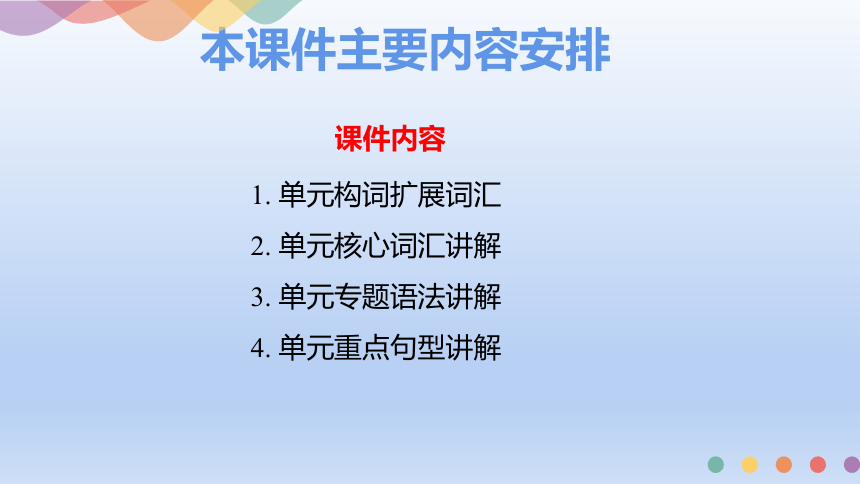
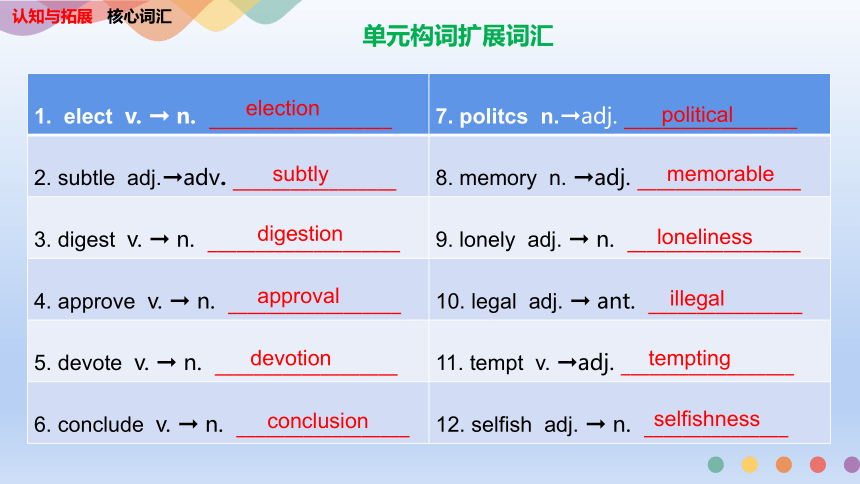
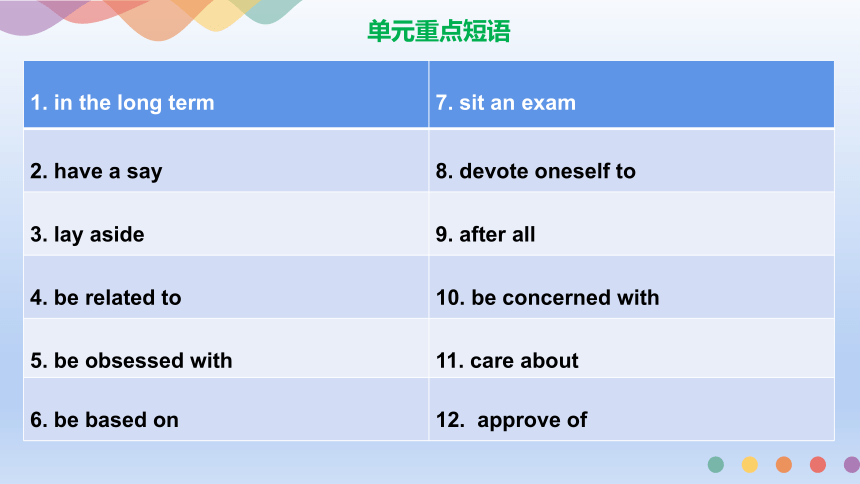
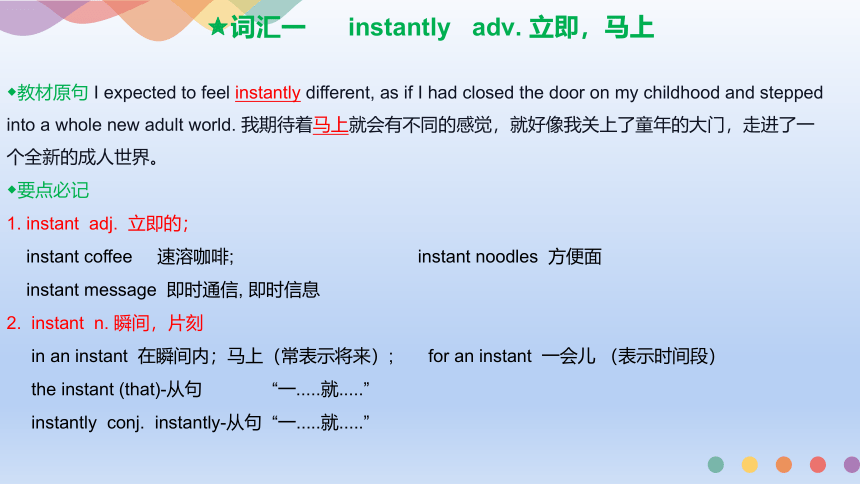
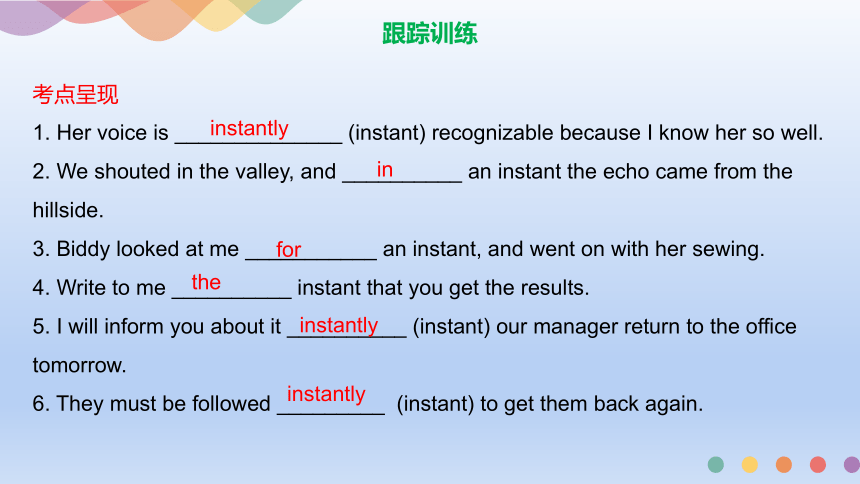
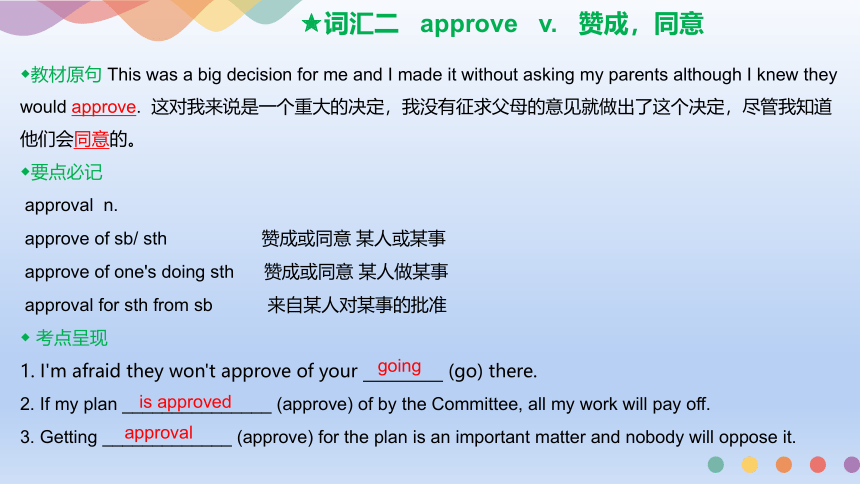
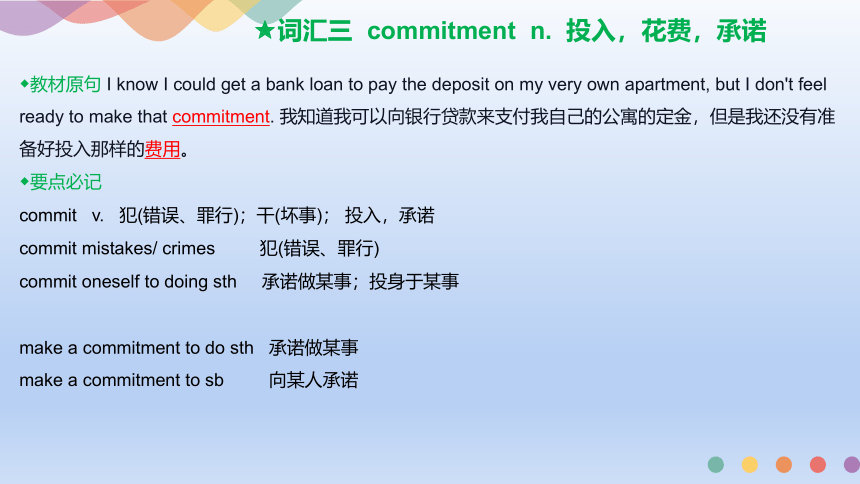
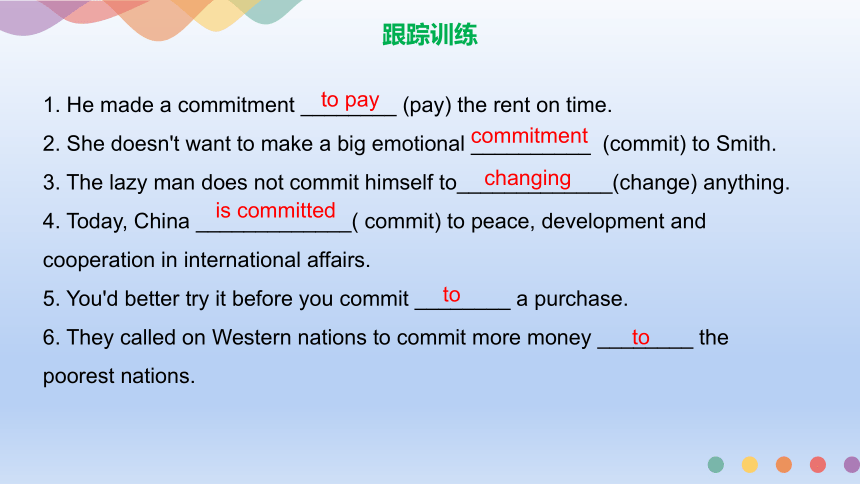
文档简介
(共22张PPT)
外研版英语 选择性必修第二册
Unit 1 Growing up
Mainly revision for this unit
本课件主要内容安排
课件内容
1. 单元构词扩展词汇
2. 单元核心词汇讲解
3. 单元专题语法讲解
4. 单元重点句型讲解
认知与拓展 核心词汇
单元构词扩展词汇
1. elect v. n. ___________________
7. politcs n. adj. __________________
2. subtle adj. adv. _________________
8. memory n. adj. _________________
3. digest v. n. ____________________
9. lonely adj. n. __________________
4. approve v. n. __________________
10. legal adj. ant. ________________
5. devote v. n. ___________________
11. tempt v. adj. __________________
6. conclude v. n. __________________
12. selfish adj. n. _______________
election
subtly
digestion
approval
devotion
conclusion
political
memorable
loneliness
illegal
tempting
selfishness
单元重点短语
1. in the long term
7. sit an exam
2. have a say
8. devote oneself to
3. lay aside
9. after all
4. be related to
10. be concerned with
5. be obsessed with
11. care about
6. be based on
12. approve of
词汇一 instantly adv. 立即,马上
◆教材原句 I expected to feel instantly different, as if I had closed the door on my childhood and stepped into a whole new adult world. 我期待着马上就会有不同的感觉,就好像我关上了童年的大门,走进了一个全新的成人世界。
◆要点必记
1. instant adj. 立即的;
instant coffee 速溶咖啡; instant noodles 方便面
instant message 即时通信, 即时信息
2. instant n. 瞬间,片刻
in an instant 在瞬间内;马上(常表示将来); for an instant 一会儿 (表示时间段)
the instant (that)-从句 “一.....就.....”
instantly conj. instantly-从句 “一.....就.....”
跟踪训练
考点呈现
1. Her voice is ______________ (instant) recognizable because I know her so well.
2. We shouted in the valley, and __________ an instant the echo came from the hillside.
3. Biddy looked at me ___________ an instant, and went on with her sewing.
4. Write to me __________ instant that you get the results.
5. I will inform you about it __________ (instant) our manager return to the office tomorrow.
6. They must be followed _________ (instant) to get them back again.
instantly
in
for
the
instantly
instantly
词汇二 approve v. 赞成,同意
◆教材原句 This was a big decision for me and I made it without asking my parents although I knew they would approve. 这对我来说是一个重大的决定,我没有征求父母的意见就做出了这个决定,尽管我知道他们会同意的。
◆要点必记
approval n.
approve of sb/ sth 赞成或同意 某人或某事
approve of one's doing sth 赞成或同意 某人做某事
approval for sth from sb 来自某人对某事的批准
◆ 考点呈现
1. I'm afraid they won't approve of your __________ (go) there.
2. If my plan _______________ (approve) of by the Committee, all my work will pay off.
3. Getting _____________ (approve) for the plan is an important matter and nobody will oppose it.
approval
is approved
going
词汇三 commitment n. 投入,花费,承诺
◆教材原句 I know I could get a bank loan to pay the deposit on my very own apartment, but I don't feel ready to make that commitment. 我知道我可以向银行贷款来支付我自己的公寓的定金,但是我还没有准备好投入那样的费用。
◆要点必记
commit v. 犯(错误、罪行);干(坏事); 投入,承诺
commit mistakes/ crimes 犯(错误、罪行)
commit oneself to doing sth 承诺做某事;投身于某事
make a commitment to do sth 承诺做某事
make a commitment to sb 向某人承诺
1. He made a commitment ________ (pay) the rent on time.
2. She doesn't want to make a big emotional __________ (commit) to Smith.
3. The lazy man does not commit himself to_____________(change) anything.
4. Today, China _____________( commit) to peace, development and cooperation in international affairs.
5. You'd better try it before you commit ________ a purchase.
6. They called on Western nations to commit more money ________ the poorest nations.
跟踪训练
to pay
changing
is committed
commitment
to
to
词汇四 routine n. 惯例, 习惯
◆教材原句 If I have to follow a strict dorm routine. 如果我必须遵守一个严格的宿舍作息惯例。
◆要点必记
as a matter of routine 作为一种常规
a dance routine 一套舞蹈动作
break/follow the routine 打破/遵守常规
make it a routine (to do sth) 养成做某事的习惯
◆考点呈现
1. We clean and repair the machines ____________ a matter of routine.
2. Make _________ a routine to drink 5 glasses of water regularly to attain best results.
3. If she wants a routine ___________ (fill) her day, let her do community work.
as
it
to fill
词汇五 consequence n. 后果, 结果;重要性
◆教材原句 I have had a great many encounters with a great many people who have been concerned with matters of consequence. 我与许多关心重要的事情的人有过很多接触。
◆要点必记
consequently adv. 因此
as a consequence of ... 由于...
of no consequence 无关紧要的
in consequence 因此
◆ 考点呈现
1. His resignation(辞职) was totally unexpected and, _________ consequence, no plans had been made for his replacement.
2. Whether you choose to be a sheep or a lion is _________ no consequence, he thinks.
3. _________ a consequence of his hard work, he was eventually admitted to Nanjing University.
in
of
As
词汇六 evidence n. 证据
◆教材原句 Choose the author's attitude towards grown-ups and find evidence to support your choice. 选择作者对成年人的态度,并找到证据来支持你的选择。
◆要点必记
evident adj. 显而易见的;显然的
in evidence 显然可见
give evidence 作证
It was evident that-从句 很显然,
There is some evidence to suggest that-从句
◆考点呈现
1. Poverty and bad housing conditions are much _________ evidence in the city.
2. It was _____________ (evidence) that the report concerning her had spread.
3. There is some evidence ______________ he is a committed reformer.
4. Have you any evidence _____________________(support) this statement
in
evident
that
to support
◆教材原句 Because it shows how we form special bonds with others by caring and taking responsibity.因为它展示了我们如何通过关心和承担责任与他人建立特殊的联系。
◆要点必记
bond v. 结合
make a good firm bond between 建立牢固的关系
strengthen bonds 加强联系
form bonds with sb 与某人有联系
bond ...to... 使牢固结合;把…紧紧地连接到
◆ 考点呈现
1. The experience created a very special bond _______________ us.
2. I think that it cannot be used to bond wood______________metal.
3. There is _________ bond of affection between the two brothers.
词汇七 bond n. 纽带, 关系,
between
to
a
语法 将来进行时态
◆ 定义:
1. 将来进行时表示将来某时间点正在进行的动作。
2. 表示正在进行的动作,但这个动作会延续到将来。
◆ 基本结构:
1. 主语+ “will + be +现在分词”;
2. 主语+ “shall + be +现在分词 (shall用于第一人称)”
◆ 判断应用(看时间,判语境)
1. 定义法:
2. 时间标志 (将来进行时常用的时间状语有 this time tomorrow,from 8:00 to 10:00 tomorrow, until next morning.等等)
3. 语境:
1. “will+动词原形”表示将来的意图,将来进行时表示未经过考虑将来便要进行的动作。如:
a. His young sisiter won’t pay this bill. 他的妹妹不肯付这笔钱。 (表意愿)
b. His young sister won’t be paying this bill. 不会由他的妹妹来付钱。(单纯谈未来情况)
2. 一般来说,将来进行时的时间状语采用“大小双重将来时间”:小时间概念+大时间概念; 而一般将来时的时间状语只采用“单一将来时间”。如:
a. What will you be doing this time tomorrow 明天这个时候你会在做什么呢?
b. What will you do tomorrow 你明天干什么?
3. 两者均可表示将来,但用将来进行时语气更委婉。如:
a. When will you pay back the money 你什么时候还钱? (似乎在直接讨债)
b. When will you be paying back the money 这钱你什么时候还呢?(委婉地商量)
将来进行时与一般将来时的区别
跟踪训练
1. I think that she _______________(work)on this experiment until next morning.
2. Please don't call me between 8:00 and 10:00 tomorrow. I _____________(have) my classes then.
3. They are listening to a tape. This time tomorrow they ____________ (sit) in the cinema.
4. When you arrive there this evening, they ______________ (cook) the meal.
5. I’m afraid I won’t be available.I ____________ (see )a friend off at o’clock this
afternoon.
6. What do you think you____________ (do )at this time next year
will be working
will be having
will be sitting
will be cooking
will be seeing
will be doing
单元重点句型
◆教材原句 but I don't feel ready to make that kind of commitment, and I do like my mom's cooking.
【句型分析】
“ and I do like my mom's cooking” 采用“谓语强调结构”: 助动词(do/does/did)+ 动词原形。
【句型拓展】
强调谓语动词:只有两种时态能强调,即一般现在时和一般过去时。
1. 在一般现在时中,do有人称的变化,第三人称单数用does;
2. 一般过去时do 变成did。其他时态的强调通过重读谓语动词来体现。如:
a. Do come in. 请快进来!
b. Her father does smoke a lot. 她爸爸吸烟很厉害。
c. I did attend the meeting yesterday. 我昨天确实参加了会议。
理解应用
1. _______ be careful when you cross the street.
2. Some people ____ believe that nuclear power poses a threat to the world peace.
3. I handed in the paper yesterday. (改写句子,对谓语进行强调)
____________________________
4. You are right. He makes a living by teaching. (改写句子,对谓语进行强调)
_______________________________
5. Do write to me when you get there.(英译汉)
_________________________________
I did hand in the paper yesterday.
He does make a living by teaching .
Do
do
你到那儿时一定要写信给我
◆教材原句 It's the time you spent on the rose that makes your rose so important.
【句型分析】
其基本句型是:“It + is/was + 被强调的成分 + that/who + 其她成分”。It 没有实意,只起语法作用,引导被强调的部分。当被强调的是人时,可用who(m)/that, 其他情况用that。
【句型拓展】
1. It is people, not things, that are decisive. (强调主语)
2. It was Jack that/whom I met yesterday. (强调宾语)
3. It was at that moment that he changed his mind. (强调时间状语)
4. It might have been on the bus that I lost my purse. (强调地点状语)
5. It is because he is ill that he is absent from today's meeting. (强调原因状语从句)
单元重点句型
1. It is because the book is very important for my present job ______ I bought it.
2. It was in the supermarket _______I gave the book to him.
3. ______ was not until Saturday that he began to prepare for the examination.
4. He has sold his dog, not his car. (对划线部分进行强调)
_____________________________________
5. I didn’t go to bed until twelve o’clock last night. (对划线部分进行强调)
_________________________________________________
6. What made him so angry (对划线部分进行强调) _________________________________
理解应用
It is his dog that he has sold, not his car.
that
that
It
It was not until twelve o'clock last night that I went to bed.
What is it that made him so angry
◆教材原句 Whatever our choices are, we should cherish and embrace those moments in life.
【句型分析】
what引导让步状语从句, 从句的语序为:Whatever +主语+谓语+其他;或者 whatever +名词+主语 +其他; 或者whatever+ 谓语+其他。
【句型拓展】
1. whatever 引导让步状语从句,可以用no matter what等替换;
2. whatever还可以引导名词性从句, 这时不能用no matter what;
3. 类似的还有, whoever/ whomever/ whichever, 例如:
a. Whatever she did was right. (whatever引导主语从句,且在从句中作宾语)
b. He does whatever she asks him to do. (whatever引导宾语从句,且在从句中作宾语)
c. I will just say whatever comes into my mind. (whatever引导宾语从句,且在从句中作主语
单元重点句型
理解应用
1. ____________reasons he may give, they can only be excuses.
2. The building must be saved, ____________ the cost is.
3. Take _____________ magazines you want to read.
4. I am willing to pay ____________ price you ask.
5. I have three cars, and you may have ______________ you like.
6. I'll give it to____________ I thought wants it .
7. Therefore, We will hire ____________ you recommend.
whomever
whoever
whichever
whatever
whatever
whatever
Whatever
外研版英语 选择性必修第二册
Unit 1 Growing up
Mainly revision for this unit
本课件主要内容安排
课件内容
1. 单元构词扩展词汇
2. 单元核心词汇讲解
3. 单元专题语法讲解
4. 单元重点句型讲解
认知与拓展 核心词汇
单元构词扩展词汇
1. elect v. n. ___________________
7. politcs n. adj. __________________
2. subtle adj. adv. _________________
8. memory n. adj. _________________
3. digest v. n. ____________________
9. lonely adj. n. __________________
4. approve v. n. __________________
10. legal adj. ant. ________________
5. devote v. n. ___________________
11. tempt v. adj. __________________
6. conclude v. n. __________________
12. selfish adj. n. _______________
election
subtly
digestion
approval
devotion
conclusion
political
memorable
loneliness
illegal
tempting
selfishness
单元重点短语
1. in the long term
7. sit an exam
2. have a say
8. devote oneself to
3. lay aside
9. after all
4. be related to
10. be concerned with
5. be obsessed with
11. care about
6. be based on
12. approve of
词汇一 instantly adv. 立即,马上
◆教材原句 I expected to feel instantly different, as if I had closed the door on my childhood and stepped into a whole new adult world. 我期待着马上就会有不同的感觉,就好像我关上了童年的大门,走进了一个全新的成人世界。
◆要点必记
1. instant adj. 立即的;
instant coffee 速溶咖啡; instant noodles 方便面
instant message 即时通信, 即时信息
2. instant n. 瞬间,片刻
in an instant 在瞬间内;马上(常表示将来); for an instant 一会儿 (表示时间段)
the instant (that)-从句 “一.....就.....”
instantly conj. instantly-从句 “一.....就.....”
跟踪训练
考点呈现
1. Her voice is ______________ (instant) recognizable because I know her so well.
2. We shouted in the valley, and __________ an instant the echo came from the hillside.
3. Biddy looked at me ___________ an instant, and went on with her sewing.
4. Write to me __________ instant that you get the results.
5. I will inform you about it __________ (instant) our manager return to the office tomorrow.
6. They must be followed _________ (instant) to get them back again.
instantly
in
for
the
instantly
instantly
词汇二 approve v. 赞成,同意
◆教材原句 This was a big decision for me and I made it without asking my parents although I knew they would approve. 这对我来说是一个重大的决定,我没有征求父母的意见就做出了这个决定,尽管我知道他们会同意的。
◆要点必记
approval n.
approve of sb/ sth 赞成或同意 某人或某事
approve of one's doing sth 赞成或同意 某人做某事
approval for sth from sb 来自某人对某事的批准
◆ 考点呈现
1. I'm afraid they won't approve of your __________ (go) there.
2. If my plan _______________ (approve) of by the Committee, all my work will pay off.
3. Getting _____________ (approve) for the plan is an important matter and nobody will oppose it.
approval
is approved
going
词汇三 commitment n. 投入,花费,承诺
◆教材原句 I know I could get a bank loan to pay the deposit on my very own apartment, but I don't feel ready to make that commitment. 我知道我可以向银行贷款来支付我自己的公寓的定金,但是我还没有准备好投入那样的费用。
◆要点必记
commit v. 犯(错误、罪行);干(坏事); 投入,承诺
commit mistakes/ crimes 犯(错误、罪行)
commit oneself to doing sth 承诺做某事;投身于某事
make a commitment to do sth 承诺做某事
make a commitment to sb 向某人承诺
1. He made a commitment ________ (pay) the rent on time.
2. She doesn't want to make a big emotional __________ (commit) to Smith.
3. The lazy man does not commit himself to_____________(change) anything.
4. Today, China _____________( commit) to peace, development and cooperation in international affairs.
5. You'd better try it before you commit ________ a purchase.
6. They called on Western nations to commit more money ________ the poorest nations.
跟踪训练
to pay
changing
is committed
commitment
to
to
词汇四 routine n. 惯例, 习惯
◆教材原句 If I have to follow a strict dorm routine. 如果我必须遵守一个严格的宿舍作息惯例。
◆要点必记
as a matter of routine 作为一种常规
a dance routine 一套舞蹈动作
break/follow the routine 打破/遵守常规
make it a routine (to do sth) 养成做某事的习惯
◆考点呈现
1. We clean and repair the machines ____________ a matter of routine.
2. Make _________ a routine to drink 5 glasses of water regularly to attain best results.
3. If she wants a routine ___________ (fill) her day, let her do community work.
as
it
to fill
词汇五 consequence n. 后果, 结果;重要性
◆教材原句 I have had a great many encounters with a great many people who have been concerned with matters of consequence. 我与许多关心重要的事情的人有过很多接触。
◆要点必记
consequently adv. 因此
as a consequence of ... 由于...
of no consequence 无关紧要的
in consequence 因此
◆ 考点呈现
1. His resignation(辞职) was totally unexpected and, _________ consequence, no plans had been made for his replacement.
2. Whether you choose to be a sheep or a lion is _________ no consequence, he thinks.
3. _________ a consequence of his hard work, he was eventually admitted to Nanjing University.
in
of
As
词汇六 evidence n. 证据
◆教材原句 Choose the author's attitude towards grown-ups and find evidence to support your choice. 选择作者对成年人的态度,并找到证据来支持你的选择。
◆要点必记
evident adj. 显而易见的;显然的
in evidence 显然可见
give evidence 作证
It was evident that-从句 很显然,
There is some evidence to suggest that-从句
◆考点呈现
1. Poverty and bad housing conditions are much _________ evidence in the city.
2. It was _____________ (evidence) that the report concerning her had spread.
3. There is some evidence ______________ he is a committed reformer.
4. Have you any evidence _____________________(support) this statement
in
evident
that
to support
◆教材原句 Because it shows how we form special bonds with others by caring and taking responsibity.因为它展示了我们如何通过关心和承担责任与他人建立特殊的联系。
◆要点必记
bond v. 结合
make a good firm bond between 建立牢固的关系
strengthen bonds 加强联系
form bonds with sb 与某人有联系
bond ...to... 使牢固结合;把…紧紧地连接到
◆ 考点呈现
1. The experience created a very special bond _______________ us.
2. I think that it cannot be used to bond wood______________metal.
3. There is _________ bond of affection between the two brothers.
词汇七 bond n. 纽带, 关系,
between
to
a
语法 将来进行时态
◆ 定义:
1. 将来进行时表示将来某时间点正在进行的动作。
2. 表示正在进行的动作,但这个动作会延续到将来。
◆ 基本结构:
1. 主语+ “will + be +现在分词”;
2. 主语+ “shall + be +现在分词 (shall用于第一人称)”
◆ 判断应用(看时间,判语境)
1. 定义法:
2. 时间标志 (将来进行时常用的时间状语有 this time tomorrow,from 8:00 to 10:00 tomorrow, until next morning.等等)
3. 语境:
1. “will+动词原形”表示将来的意图,将来进行时表示未经过考虑将来便要进行的动作。如:
a. His young sisiter won’t pay this bill. 他的妹妹不肯付这笔钱。 (表意愿)
b. His young sister won’t be paying this bill. 不会由他的妹妹来付钱。(单纯谈未来情况)
2. 一般来说,将来进行时的时间状语采用“大小双重将来时间”:小时间概念+大时间概念; 而一般将来时的时间状语只采用“单一将来时间”。如:
a. What will you be doing this time tomorrow 明天这个时候你会在做什么呢?
b. What will you do tomorrow 你明天干什么?
3. 两者均可表示将来,但用将来进行时语气更委婉。如:
a. When will you pay back the money 你什么时候还钱? (似乎在直接讨债)
b. When will you be paying back the money 这钱你什么时候还呢?(委婉地商量)
将来进行时与一般将来时的区别
跟踪训练
1. I think that she _______________(work)on this experiment until next morning.
2. Please don't call me between 8:00 and 10:00 tomorrow. I _____________(have) my classes then.
3. They are listening to a tape. This time tomorrow they ____________ (sit) in the cinema.
4. When you arrive there this evening, they ______________ (cook) the meal.
5. I’m afraid I won’t be available.I ____________ (see )a friend off at o’clock this
afternoon.
6. What do you think you____________ (do )at this time next year
will be working
will be having
will be sitting
will be cooking
will be seeing
will be doing
单元重点句型
◆教材原句 but I don't feel ready to make that kind of commitment, and I do like my mom's cooking.
【句型分析】
“ and I do like my mom's cooking” 采用“谓语强调结构”: 助动词(do/does/did)+ 动词原形。
【句型拓展】
强调谓语动词:只有两种时态能强调,即一般现在时和一般过去时。
1. 在一般现在时中,do有人称的变化,第三人称单数用does;
2. 一般过去时do 变成did。其他时态的强调通过重读谓语动词来体现。如:
a. Do come in. 请快进来!
b. Her father does smoke a lot. 她爸爸吸烟很厉害。
c. I did attend the meeting yesterday. 我昨天确实参加了会议。
理解应用
1. _______ be careful when you cross the street.
2. Some people ____ believe that nuclear power poses a threat to the world peace.
3. I handed in the paper yesterday. (改写句子,对谓语进行强调)
____________________________
4. You are right. He makes a living by teaching. (改写句子,对谓语进行强调)
_______________________________
5. Do write to me when you get there.(英译汉)
_________________________________
I did hand in the paper yesterday.
He does make a living by teaching .
Do
do
你到那儿时一定要写信给我
◆教材原句 It's the time you spent on the rose that makes your rose so important.
【句型分析】
其基本句型是:“It + is/was + 被强调的成分 + that/who + 其她成分”。It 没有实意,只起语法作用,引导被强调的部分。当被强调的是人时,可用who(m)/that, 其他情况用that。
【句型拓展】
1. It is people, not things, that are decisive. (强调主语)
2. It was Jack that/whom I met yesterday. (强调宾语)
3. It was at that moment that he changed his mind. (强调时间状语)
4. It might have been on the bus that I lost my purse. (强调地点状语)
5. It is because he is ill that he is absent from today's meeting. (强调原因状语从句)
单元重点句型
1. It is because the book is very important for my present job ______ I bought it.
2. It was in the supermarket _______I gave the book to him.
3. ______ was not until Saturday that he began to prepare for the examination.
4. He has sold his dog, not his car. (对划线部分进行强调)
_____________________________________
5. I didn’t go to bed until twelve o’clock last night. (对划线部分进行强调)
_________________________________________________
6. What made him so angry (对划线部分进行强调) _________________________________
理解应用
It is his dog that he has sold, not his car.
that
that
It
It was not until twelve o'clock last night that I went to bed.
What is it that made him so angry
◆教材原句 Whatever our choices are, we should cherish and embrace those moments in life.
【句型分析】
what引导让步状语从句, 从句的语序为:Whatever +主语+谓语+其他;或者 whatever +名词+主语 +其他; 或者whatever+ 谓语+其他。
【句型拓展】
1. whatever 引导让步状语从句,可以用no matter what等替换;
2. whatever还可以引导名词性从句, 这时不能用no matter what;
3. 类似的还有, whoever/ whomever/ whichever, 例如:
a. Whatever she did was right. (whatever引导主语从句,且在从句中作宾语)
b. He does whatever she asks him to do. (whatever引导宾语从句,且在从句中作宾语)
c. I will just say whatever comes into my mind. (whatever引导宾语从句,且在从句中作主语
单元重点句型
理解应用
1. ____________reasons he may give, they can only be excuses.
2. The building must be saved, ____________ the cost is.
3. Take _____________ magazines you want to read.
4. I am willing to pay ____________ price you ask.
5. I have three cars, and you may have ______________ you like.
6. I'll give it to____________ I thought wants it .
7. Therefore, We will hire ____________ you recommend.
whomever
whoever
whichever
whatever
whatever
whatever
Whatever
